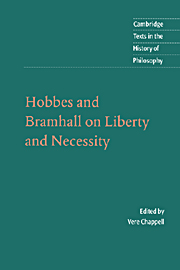Book contents
- Frontmatter
- Contents
- Acknowledgements
- List of abbreviations
- Introduction
- Chronology
- Further reading
- Note on the text
- Bramhall's discourse of liberty and necessity
- Hobbes's treatise Of Liberty and Necessity
- Selections from Bramhall, A Defence of True Liberty
- Selections from Hobbes, The Questions concerning Liberty, Necessity, and Chance
- Selections from other works of Hobbes
- Index
- Cambridge texts in the history of philosophy
Selections from Bramhall, A Defence of True Liberty
Published online by Cambridge University Press: 05 June 2012
- Frontmatter
- Contents
- Acknowledgements
- List of abbreviations
- Introduction
- Chronology
- Further reading
- Note on the text
- Bramhall's discourse of liberty and necessity
- Hobbes's treatise Of Liberty and Necessity
- Selections from Bramhall, A Defence of True Liberty
- Selections from Hobbes, The Questions concerning Liberty, Necessity, and Chance
- Selections from other works of Hobbes
- Index
- Cambridge texts in the history of philosophy
Summary
§ 3 … (a) Thus much I will maintain, that that is no true necessity which he calls necessity, nor that liberty which he calls liberty, nor that the question which he makes the question.
First for liberty: that which he calls liberty is no true liberty.
For the clearing whereof, it behoves us to know the difference between these three: necessity, spontaneity, and liberty.
Necessity and spontaneity may sometimes meet together; so may spontaneity and liberty; but real necessity and true liberty can never meet together. Some things are necessary and not voluntary or spontaneous; some things are both necessary and voluntary; some things are voluntary and not free; some things are both voluntary and free; but those things which are truly necessary can never be free, and those things which are truly free can never be necessary. Necessity consists in an antecedent determination to one; spontaneity consists in a conformity of the appetite, either intellectual or sensitive, to the object; true liberty consists in the elective power of the rational will. That which is determined without my concurrence may nevertheless agree well enough with my fancy or desires, and obtain my subsequent consent; but that which is determined without my concurrence or consent cannot be the object of my election. I may like that which is inevitably imposed upon me by another, but if it be inevitably imposed upon me by extrinsical causes, it is both folly for me to deliberate, and impossible for me to choose, whether I shall undergo it or not.
- Type
- Chapter
- Information
- Hobbes and Bramhall on Liberty and Necessity , pp. 43 - 68Publisher: Cambridge University PressPrint publication year: 1999



